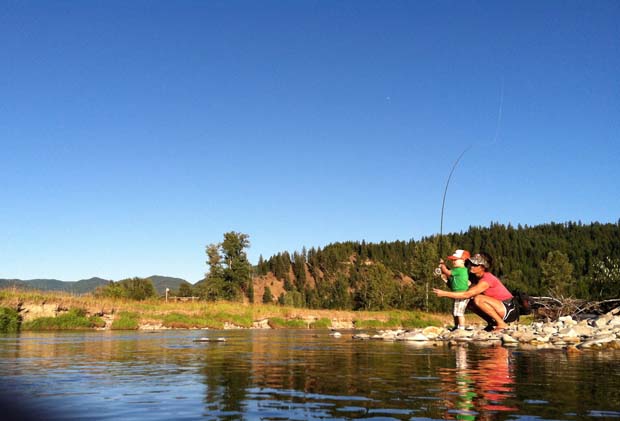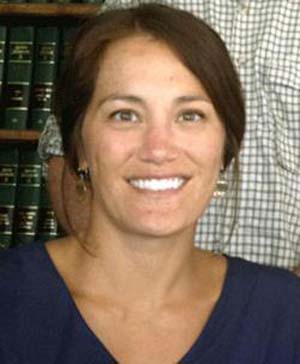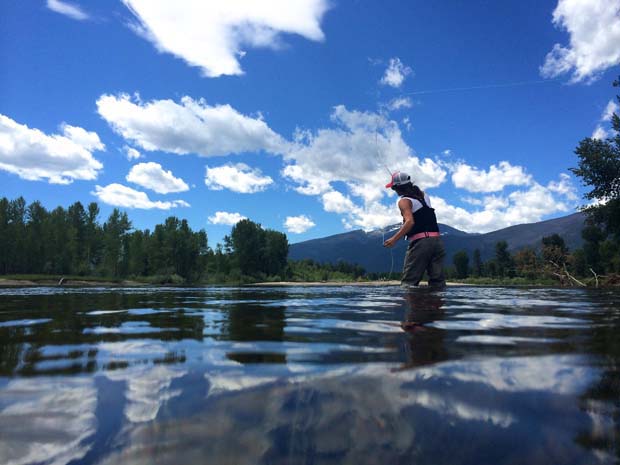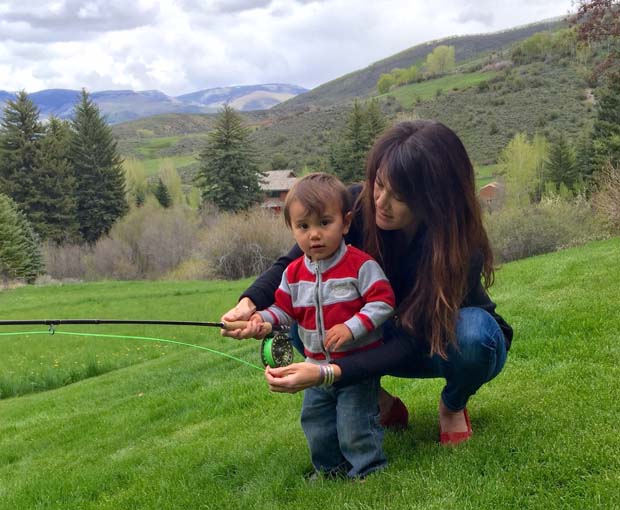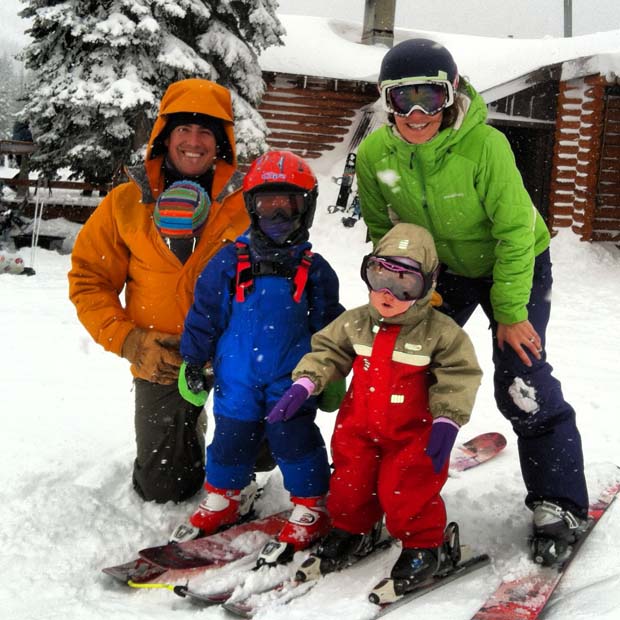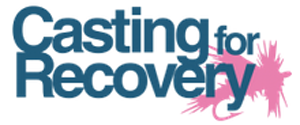By Peter Nardini for the American Museum of Fly Fishing
[dropcap]R[/dropcap]aised near Glacier National Park, Whitney is truly a product of the outdoors. Whitney spent nearly a decade as a fly fishing and whitewater rafting guide on Glacier’s Flathead River system, working her way through a degree from the University of Montana. It was during her time as a fishing guide that Whitney first heard of Casting for Recovery, a nonprofit dedicated to providing healing fly fishing experiences for breast cancer survivors. She followed the organization for years, then helped launch the first Western Montana retreat in 2011, where she continues to volunteer as a fly fishing instructor.
In her quest to pursue an outdoor lifestyle and share this passion with others, Whitney worked at a leading outdoor adventure therapy organization for eight years before joining Casting for Recovery in the summer of 2013. She splits her time between the mountains of Montana and the CfR office in Vermont. Casting for Recovery now hosts 40 retreats across the country, serving 600 breast cancer survivors each year. The retreats offer opportunities for women to find inspiration, discover renewed energy for life and experience healing connections with other women and nature.
When not working or traveling for CfR, Whitney can be found wading Montana’s rivers or chasing her kids down the ski slopes. She’s passionate about microbrews, sushi, and protecting and restoring coldwater fisheries and watersheds. We caught up with her recently to see what it’s like in a day in the life of the Casting for Recovery (CfR) Executive Director:
What is it about CfR that drew you to it and led you to where you are now?
WLM: I first heard about CfR in the late nineties. I was fairly new to fly fishing and was obsessed with Joan Wulff. Well, I’m actually still obsessed with Joan Wulff. But at the time, I was studying her teachings very closely and heard a radio interview where Joan mentioned an organization called Casting for Recovery that utilizes fly fishing to promote physical and emotional healing for breast cancer survivors. It was an immediate connection and I knew I wanted to be involved. I wrote a letter to CfR inquiring about an internship. The internship never transpired, but years later I volunteered as a fly fishing instructor when the program came to Western MT. I still volunteer at that retreat each September, it’s one of the highlights of my year.
What is your focus moving forward with CfR? Future plans?
WLM: Casting for Recovery has served more than 7,000 women to date. Nearly 600 women attend CfR retreats each year, which is wonderful. But we still have a lot of work to do. We’re currently only serving one-third of the women who apply. The demand for this program is so great, and it’s difficult to have to turn so many women away. I’m focused on reaching more women in a way that is also sustainable and smart for the health of the organization. I’m dedicated to establishing and nurturing strong relationships and partnerships that will allow us to continue innovating and expanding our reach.
What was your first experience like with Gwenn and Benita as CfR co-founders, any thoughts looking back at 20 years of CfR?
WLM: Gwenn and Benita are incredible women. They are both still very supportive of Casting for Recovery. Gwenn recently competed in the Iditarod, and used that experience to raise funds and awareness for CfR. Gwenn and Benita are humble, thoughtful co-founders. They both acknowledge that CfR is the product of a group of passionate women who believed in this concept and came together to make it a reality. It was a very grassroots origin and a team effort. They’re both amazed at how CfR has grown over the past 20 years.
I’m sure that there has been many pivotal moments or experiences, any that stand out in particular? Any aha moment when you saw things coming together with your vision and its effect on the retreats?
WLM: This isn’t a specific ‘aha’ moment, but I hear from people on a daily basis whose lives have been positively impacted by CfR. I just returned from ICAST, a big fishing industry tradeshow in Orlando. We had so many people come up and introduce themselves and share their stories – women who had attended, men who had volunteered, or industry partners who felt personally connected. It’s inspiring to see the impact being made across the country and even internationally. I’m honored to be a small part of that.
How has your background in wilderness therapy helped in what you do?
WLM: I’m so grateful to have had the opportunity to work with some of the leaders in outdoor adventure therapy. The biggest takeaway for me has been the importance of providing an authentic experience. So much of what we do at CfR is just creating the right environment to allow healing to happen organically through shared experience. We’re not trying to groom professional fly casters, we’re just allowing women to share an authentic experience and connect with the natural world. It seems so simple, but sometimes creating the right environment to encourage that healing can be trickier than it sounds. CfR has worked hard to also incorporate the elements of medical education and facilitated emotional support, enhancing the program.
What is it about fly fishing and the overall effect of being on the water or participating in active sports in nature that is so universal in helping people heal from whatever it is that they are dealing with?
WLM: I believe that outdoor experiences renew our spirits and remind us we’re alive! That sounds corny, I know, but so many people are dealing with seemingly insurmountable challenges. Physical hardship or illness, emotional stress, societal pressure and expectations, etc. When you’re standing in the river, climbing up a mountain, or even just watching the sunset, here’s a deep connection that pulls at the core of who you are beneath those stressors. Outdoor experiences seem to provide a clarity and a boost of adrenaline that remind us that our life circumstances—physical or emotional—do not have to define us.
Who or what event got you into fly fishing?
WLM: My sister started fly fishing when we were teenagers and got me into it. My dad is not a fly fisher, but he’s an outdoorsman in the truest sense—a man with a true respect and appreciation for our natural resources and the healing properties of the outdoors. We were raised deeply rooted in outdoor experience so my connection to fly fishing seemed natural.
How do you encourage and engage women to participate in the sport?
WLM: I think the most important thing we can do to encourage women to get involved is really work on lowering the barriers to entry. The world of fly fishing can be intimidating, so I try to focus on keeping things light and fun, and creating a comfortable, low-key way for women to experience fishing. At CfR, we try to send women home with some basic information, tools and resources to help them continue fly fishing. This includes continuing alumni fishing outings, connection to local Trout Unlimited Chapters, and information on basic gear they’ll need to get started. I think we, as an industry, need to do a better job of reaching young women and girls, introducing them to the outdoors and encouraging them to explore fishing. It’s been great to see efforts like Trout Unlimited’s Women’s Initiative and Stream Girls focused on engaging more women and girls.
What would you say to kids such as your own or the younger generation who are just getting into the sport of fly fishing?
WLM: My kids are still pretty young, so I just try to keep it fun! If a slow day of fishing turns into a rock skipping competition, that’s great. I also believe it’s never too early to start educating kids on the importance of being stewards for our natural resources. I want the younger generation to understand that these watersheds are ours to protect, and that their role in that is crucial. It can start with picking up trash on the riverbank—even that is enough to plant the seed of consciousness that the health of our fisheries will rely on in the coming years.
How are you able to balance work, family, and doing fun things with your family?
WLM: I certainly don’t have it all figured out! There are days when finding balance is really hard. My best tip is something I’ve learned from my work with Casting for Recovery. At CfR retreats, most of the women who attend have never touched a fly rod or even ventured into the outdoors much. Introducing them to fly fishing winds up being an incredible vehicle for healing. Fly fishing gives us all an opportunity to be truly present and focused on the task at hand. For the women who attend CfR, this means a reprieve from thinking about treatment, side effects, medications, and all of the other challenges that come with life after a breast cancer diagnosis. Watching their focus and concentration as they learn their knots, practice casting, and carefully step into the stream is such a great reminder of how restorative this sport can be for all of us. I try to remember that in my own life—whether it’s in my own fishing, or tucking my kids into bed at night—being as present as possible in each moment is really important. And, coffee!
What is the significance of being in the fly fishing industry with your sister, Hilary Hutcheson (host of Trout TV, guide, and, more recently, fly shop owner). Wearing multiple hats seems to be a common theme with you two.
WLM: It’s fun to be able to work and play in the same space as my sister. We’re able to support each other and brainstorm solutions. Hilary has worked really hard to create a successful career out of her passions, and she is constantly pursuing a more mindful, adventurous life. Sometimes we’ll randomly run in to each other in the airport and slap a high five as we cross paths. The days we’re on the river together are the best! No pressure, no agenda, just fun. It sounds cliché, but the old ‘work hard/play hard’ model really drives us. She works and plays harder than anyone I know.
Any fun stories from the field as a whitewater rafting guide or from CfR?
WLM: I once missed the take-out on a multi-day fishing/rafting trip on the Flathead River near the Canadian border. I had to tie up my boat and hike up to the road, with my clients. It doesn’t get more embarrassing than that!
[information]
American Museum of Fly Fishing . . .
[/information]


